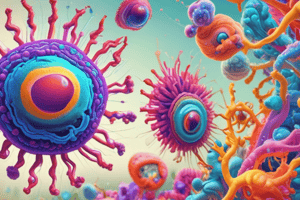Podcast
Questions and Answers
What is considered the fundamental unit of life in all living organisms?
What is considered the fundamental unit of life in all living organisms?
- Mitochondria
- Cells (correct)
- Tissues
- Organelles
Which organelle is responsible for housing a cell's genetic material?
Which organelle is responsible for housing a cell's genetic material?
- Mitochondria
- Cell Membrane
- Chloroplast
- Nucleus (correct)
What process do chloroplasts facilitate in plants?
What process do chloroplasts facilitate in plants?
- Cellular Respiration
- Mitosis
- Fermentation
- Photosynthesis (correct)
What do species develop as they evolve according to the theory of evolution?
What do species develop as they evolve according to the theory of evolution?
Who proposed the theory of evolution that continues to shape our understanding of life?
Who proposed the theory of evolution that continues to shape our understanding of life?
What is the primary function of mitochondria within a cell?
What is the primary function of mitochondria within a cell?
What is the main focus of ecology?
What is the main focus of ecology?
Which branch of biology studies DNA replication and gene expression?
Which branch of biology studies DNA replication and gene expression?
What is essential to understanding how organisms convert energy from food into life-sustaining activities?
What is essential to understanding how organisms convert energy from food into life-sustaining activities?
How do plants primarily communicate with their neighbors?
How do plants primarily communicate with their neighbors?
Which field of study focuses on microorganisms like bacteria and viruses?
Which field of study focuses on microorganisms like bacteria and viruses?
What recent technology is mentioned as opening new avenues for treating genetic diseases?
What recent technology is mentioned as opening new avenues for treating genetic diseases?
Flashcards are hidden until you start studying
Study Notes
Exploring Science: A Trip through Biology
Delving into the realm of science, we find ourselves particularly captivated by the intricately woven tapestry of life known as biology. This branch of science encompasses the study of living organisms and their interactions with the world around them. As we embark on this informative journey, we'll be exploring the fascinating facets of biology that have shaped our understanding of life and continue to fuel our curiosity.
The Building Blocks of Life: Cells
At the heart of all living organisms lie cells, tiny structures that function as the fundamental unit of life. Each cell contains various organelles, specialized structures that enable cells to perform their diverse functions. For instance, the nucleus houses a cell's genetic material, the mitochondria produce energy, and the chloroplasts facilitate photosynthesis in plants.
The Evolution of Species: Darwin's Legacy
The theory of evolution, first proposed by Charles Darwin, continues to shape our understanding of life's beginnings and its endless adaptations. As species evolve, they develop unique characteristics, adapt to their environments, and interact with other organisms. This theory provides the scientific basis for why every living organism, from unicellular bacteria to complex, multicellular animals, possesses distinct traits.
The Art of Survival: Ecology
Ecology, the study of relationships between living organisms and their environment, is a critical aspect of biology. It explores the delicate balance between species and various ecosystems. For example, ecologists study the interactions between predators and prey, the effects of habitat destruction on species survival, and the cycling of nutrients in ecosystems.
The Language of Life: Molecular Biology
Molecular biology is the study of biological processes at the molecular level, including DNA replication, transcription, translation, and gene expression. This branch of biology enables us to understand how the genetic code is read and translated into the proteins that make up the building blocks of life.
The Power of Life: Energy and Metabolism
Every living organism requires energy to survive and reproduce. Metabolism, the chemical processes that occur within living organisms to maintain life, is essential to understanding how organisms convert energy from food into the energy required to sustain life's activities. For instance, aerobic respiration, the process by which cells obtain energy from the breakdown of glucose, is a fundamental aspect of metabolism.
The Art of Communication: Communication and Signalization
Organisms of all kinds rely on communication to interact with their environment and with each other. Chemical signaling, neural signaling, and behavioral signaling are just a few ways that organisms communicate with their world and with each other. For instance, plants use chemical signaling to communicate with their neighbors, and animals use vocalizations and body language to interact with their peers.
The Invisible Threat: Microbiology
Microbiology, the study of microorganisms such as bacteria, viruses, fungi, and protists, is an essential aspect of biology. While some microorganisms pose threats to human health, others play vital roles in ecosystems, contribute to the decomposition of organic matter, and even produce valuable medicines and industrial products.
The Endless Frontier: Advances in Biology
As we continue to explore the depths of biology, we uncover new insights and discoveries that challenge and expand our understanding of life. For instance, recent advances in genome sequencing have allowed scientists to create more accurate maps of the human genome and identify the genetic basis of various diseases. Additionally, CRISPR gene editing technology is opening new avenues for treating genetic diseases and improving agricultural productivity.
Biology, a rich and diverse field of study, offers a multitude of opportunities to explore the mysteries of life. From the intricate workings of cells to the complex interactions between organisms and their environments, biology provides a unique and fascinating perspective on the world around us. As we continue to innovate and expand our understanding of life, we can expect even more exciting discoveries in the years to come.
Studying That Suits You
Use AI to generate personalized quizzes and flashcards to suit your learning preferences.



